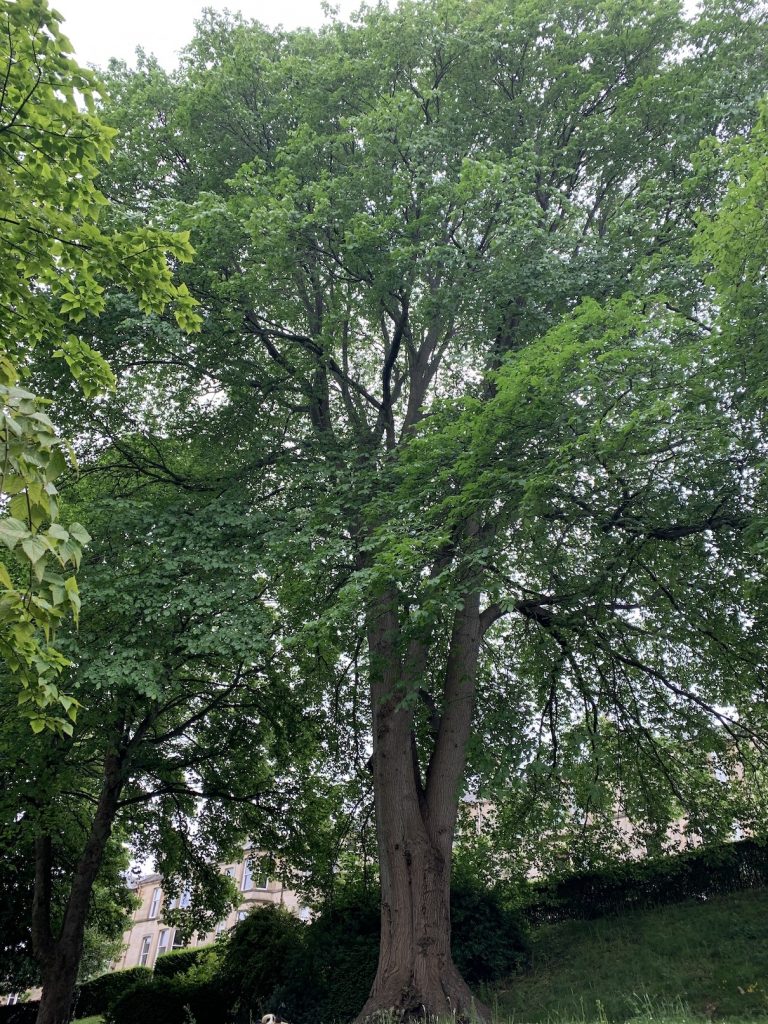Summer Branch Drop
Edinburgh has a wonderful variety of Elm tree species, many of which have never been definitively identified. Wych Elm, Huntingdon Elm, English Elm, Dutch Elm and Wheatley Elm are among those that are most commonly seen.
Unfortunately, this year, there has been a propensity for the phenomenon known as ‘summer branch drop’ (SBD). This is when a large tree sheds a limb without prior symptoms, warning nor explanation.
This most commonly happens with Oak, Elm, Sweet Chestnut, Ash, Beech, Horse Chestnut, Willow and Polar, but it has been recorded to happen to other trees.
In the last few weeks, there have been several cases of SBD in Edinburgh. The failure is usually on a fairly horizontal branch that may be end-loaded or exposed. The branch fracture is sudden and happens without warning. The failure point is on the branch close to – but not at – the union.
The mechanism for this type of failure is not yet understood but it seems to occur after a long period of drought that is followed by a period of heavy rain. This weather is what we experienced in Edinburgh in late May. Several Elm limbs have failed throughout June.
Without extensive investigation of each tree, it may not be possible to determine exactly why these Elm branches have failed, but it is likely to be due to the wood drying out, fibres cracking and then failing once the vessels fill with water and the wood expands.
There is no need to panic about going out among trees – the risk of injury is very low. And so far there have been no reports of injuries from any of the limbs that have failed in the last month. But you can reduce the risk further by avoiding big trees when it is windy. Also, avoid stopping under large horizontal limbs for a few weeks after a long period of drought.
This is by no means a new phenomenon. In his poem ‘A Tree Song’ (1906), Rudyard Kipling warned of the dangers of the Elm: “Ellum she hateth mankind …” (see blow for the full poem). This is slightly over-dramatic but it is a fair warning nonetheless.
A final word on the Elm. They are one of our grandest and most beautiful trees. Britain has lost millions of them since the middle of last century, and – alongside Brighton – Edinburgh is one of only two oases of Elms that are left on this island. We are still losing a large number each year because of Dutch Elm Disease, and we need to cherish those that we have left. So go out and find an Elm and marvel at its grandeur, its dominance, its beauty. And wonder at the fact that it has all been made from sunlight, air, water and a few minerals.
A Tree Song (Rudyard Kipling)
OF all the trees that grow so fair,
Old England to adorn,
Greater are none beneath the Sun,
Than Oak, and Ash, and Thorn.
Sing Oak, and Ash, and Thorn, good sirs,
(All of a Midsummer morn!)
Surely we sing no little thing,
In Oak, and Ash, and Thorn!
Oak of the Clay lived many a day,
Or ever AEneas began.
Ash of the Loam was a lady at home,
When Brut was an outlaw man.
Thorn of the Down saw New Troy Town
(From which was London born);
Witness hereby the ancientry
Of Oak, and Ash, and Thorn!
Yew that is old in churchyard-mould,
He breedeth a mighty bow.
Alder for shoes do wise men choose,
And beech for cups also.
But when ye have killed, and your bowl is spilled,
And your shoes are clean outworn,
Back ye must speed for all that ye need,
To Oak, and Ash, and Thorn!
Ellum she hateth mankind, and waiteth
Till every gust be laid,
To drop a limb on the head of him
That anyway trusts her shade:
But whether a lad be sober or sad,
Or mellow with ale from the horn,
He will take no wrong when he lieth along
‘Neath Oak, and Ash, and Thorn!
Oh, do not tell the Priest our plight,
Or he would call it a sin;
But – we have been out in the woods all night,
A-conjuring Summer in!
And we bring you news by word of mouth-
Good news for cattle and corn-
Now is the Sun come up from the South,
With Oak, and Ash, and Thorn!
Sing Oak, and Ash, and Thorn, good sirs
(All of a Midsummer morn):
England shall bide ti11 Judgment Tide,
By Oak, and Ash, and Thorn!
